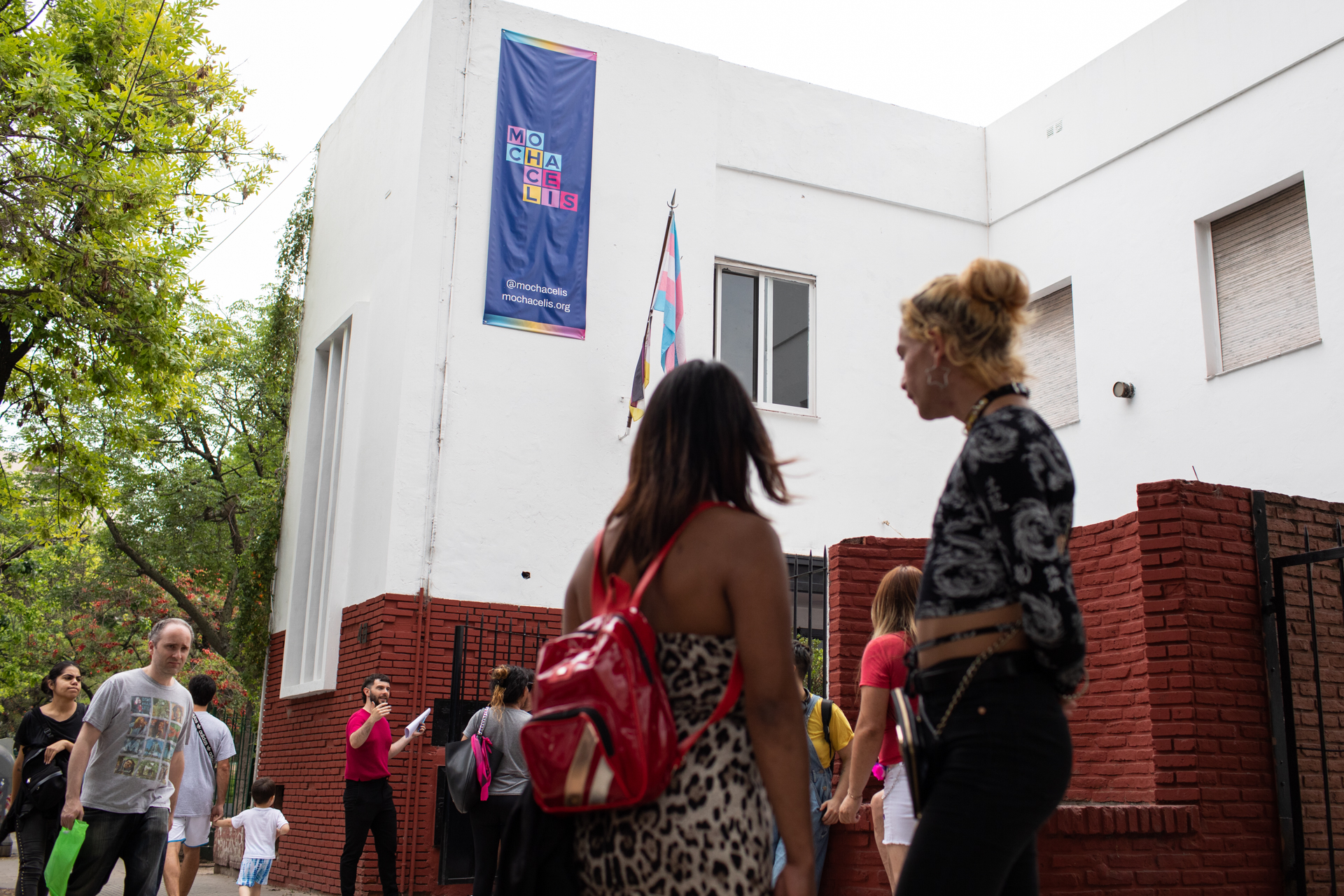An inclusive project to complete studies: the story of Mocha Celis, the first transgender, trans, and non-binary High School in the world
Based in Buenos Aires, it has already graduated 300 people. The course lasts three years and also offers vocational training


By Paula Galinsky
Created in 2011, not as a result of a single need, but of many, the Bachillerato Mocha Celis (“Mocha Celis High School’), the main project of the Civil Association of the same name, became the first popular transgender, trans, and non-binary school in the world.
It was created to include, welcome, and support. “It was an initiative of a group of people from the LGBTyQ+ community. At that time, about 90% of transgender and trans people were expelled from their homes between the ages of 13 and 18,” says Manu Mireles, secretary and co-founder of the Asociación Civil Mocha Celis (‘Mocha Celis Civil Association’) and the High School. At 45, Manu is a non-binary trans person and has been an activist for three decades.
According to Mireles, “95% of them had not completed high school and had not obtained formal employment either.”
She says the situation started to improve with the Gender Identity Law (Law No. 26,743 of 2012), although there is still much to be done.
“We talk about social transvesticide because from the moment we are born and identify as trans people, love and care are denied to us. Most of us are pushed into prostitution or sex work”, warns Manu, who also mentions the lack of access to health care and decent housing.
It is in this context and in the face of such an extreme scenario that the Bachillerato Mocha Celis (“Mocha Celis High School’) arrives, aimed at people over 18 who want to study, either to complete high school or even elementary school.
It is a public school managed by the Ministerio de Educación de la Ciudad de Buenos Aires (‘Ministry of Education of the City of Buenos Aires’). The course lasts for three years and classes are held every afternoon. They have already graduated 300 people.
Manu clarifies that the “Bachi” is open to anyone who wants to complete their studies. “It is not exclusively for transgender, trans, and non-binary people, it is a space that seeks to contain,” she comments.
It offers education with a human rights perspective and non-binary Comprehensive Sex Education (ISE). Its experience served as an example for the creation of similar proposals in 15 other Argentine provinces, as well as inspiring projects in Brazil, Chile, Paraguay and Costa Rica.
The school includes a vocational training program in trades and arts. “We have courses in digital literacy and web design. We also offer bakery workshops, kitchen assistant training, and technology testing training,” summarizes Mireles. And she says that English, photography, poetry, body expression and theater can also be studied.
In addition, they have social workers and lawyers, offering comprehensive health support.
The contribution of Mocha in the first person
Virginia Silveira had a very difficult childhood. “I was expelled from home at the age of 12 for being a transvestite”, she says.
It was at that age that she left her hometown of Salta bound for Buenos Aires. “I took a bus, arrived in the Capital, and settled in the Gondolín Hotel, which welcomes members of the trans community”, she details.
She lived there for two years. Then she returned to Salta with the intention of reintegrating herself. “I tried to go back to school, but in the evening school, the concern was whether I would use the women’s or men’s bathroom, no one thought about what I felt or needed”.
“We were several transvestites and we suffered a lot of discrimination”, comments Virginia, who finally boarded the bus again bound for Buenos Aires and had her third attempt with education, this time through Mocha Celis.
“Those of us who are a little older never thought about what we wanted to do, society condemned us to be on the streets. For a long time, I thought I was going to die there”, adds Virginia, hoping that “the next generations have other options”.
She emphasizes that at Mocha it was the first time she felt good studying. “I imagined I would feel uncomfortable and I found teachers who adapted to our needs. I also understood that I brought prior knowledge that was important. Training was fundamental for me and it also helped me improve my self-esteem”, she reflects.
The three years of the course were “very good”, according to Virginia. And they coincided with the enactment of the Gender Identity Law and the possibility of changing her ID.
Additionally, during that time, she obtained formal employment at a restaurant. “It was thanks to the High School, through its job placement service”, she asserts.
After graduating, she obtained an administrative position at the Ministerio Público Fiscal de la Nación (‘National Public Prosecutor’s Office’). Years later, she joined the High School again, this time as a teacher. “Since 2021, I have been teaching the subjects of Research Methodology and Community Development”, she says. “I am happy with the change my life has undergone. Mocha had a lot to do with it”, she concludes.
How to support the High School
“We finance our activities with contributions from the community and there is also a lot of volunteer work,” shares Manu. And she adds: “Since we established ourselves as a Civil Association, we have had support from some companies for specific projects.”
You can collaborate by contacting Mocha through their website https://mochacelis.org/.


